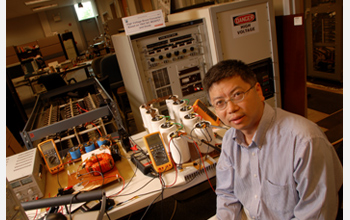News Release 08-174
NSF Launches Third Generation of Engineering Research Centers with Awards Totaling $92.5 Million
Five new centers will pursue innovations in biorenewable chemicals, green energy systems, communications networks, medical implants and smart lighting.

Alex Huang will research ways to integrate renewable energy sources into the nation's power grid.
October 6, 2008
This material is available primarily for archival purposes. Telephone numbers or other contact information may be out of date; please see current contact information at media contacts.
The National Science Foundation (NSF) announces the establishment of five new NSF Engineering Research Centers (ERCs) for the development of interdisciplinary research and education programs in partnership with industry. The NSF ERCs share the goal of advancing knowledge, technology, and innovations that address significant societal problems and provide the workforce and technical foundation for economic competitiveness. NSF will invest approximately $92.5 million in the centers over the next five years.
Since 1985, the ERC program has fostered broad-based research and education collaborations among university and industry partners to focus on technological breakthroughs that lead to new products and services and on strengthening the capacity of U.S. engineering graduates to compete in global markets. The five centers launched this fall initiate a third generation of NSF ERCs that places increased emphasis on innovation and entrepreneurship, partnerships with small research firms and international collaboration and cultural exchange.
"The Gen-3 ERCs have been designed to build on the well-developed understanding laid down by the two previous generations of ERCs," says Lynn Preston, leader of NSF's ERC program. "We have added several new dimensions designed to speed the innovation process and prepare engineering graduates who are innovative, creative and understand how to function in a global economy where engineering talent is broadly distributed throughout the world. We expect these ERCs to make even more significant impacts on the competitiveness of U.S. industry than their predecessors."
Including the new awards, NSF supports 15 ERCs in the areas of biotechnology and health care; energy, sustainability and infrastructure; and microelectronics, sensing and information technology. Brief descriptions of the new centers follow.
The NSF ERC for Biorenewable Chemicals (CBiRC), based at Iowa State University, seeks to transform the existing petrochemical-based chemical industry to one based on renewable materials. More
The NSF ERC for Future Renewable Electric Energy Delivery and Management (FREEDM) Systems, based at North Carolina State University, will conduct research to transform the nation's power grid into an efficient network that integrates alternative energy generation and new storage methods with existing power sources. More
The NSF ERC for Integrated Access Networks (CIAN), based at the University of Arizona, will conduct research to create transformative technologies for optical access networks that offer dramatically improved performance and expanded capabilities. More
The NSF ERC for Revolutionizing Metallic Biomaterials, based at North Carolina Agricultural and Technical State University, aims to transform current medial and surgical treatments by creating "smart" implants for craniofacial, dental, orthopedic and cardiovascular interventions. More
The NSF Smart Lighting ERC, based at Rensselaer Polytechnic Institute, aims to create new solid-state lighting technologies to enable rapid biological imaging, novel modes of communication, efficient displays and safer transportation. More
-NSF-
-
CIAN Director Nasser Peyghambarian and student Aytekin Ozdemir discuss a critical network subsystem.
Credit and Larger Version -
Jag Sankar will create "smart" implants for medical interventions in North Carolina.
Credit and Larger Version -
The Smart Lighting ERC will search for ways to make lighting more useful and easier to manufacture.
Credit and Larger Version
Media Contacts
Joshua A. Chamot, NSF, (703) 292-7730, email: jchamot@nsf.gov
Cecile J. Gonzalez, NSF, (703) 292-8070, email: cjgonzal@nsf.gov
Shena Crittendon, North Carolina A&T, (336) 256-0861, email: scritten@ncat.edu
Nate DeGraff, NCSU, (919) 515-3848, email: nate_degraff@ncsu.edu
Jeff Harrison, University of Arizona, (520) 626-4386, email: jeffh@u.arizona.edu
Mike Krapfl, Iowa State, (515) 294-4917, email: mkrapfl@iastate.edu
Michael Mullaney, Rensselaer Polytechnic Institute, (518) 276-6161, email: mullam@rpi.edu
Angelica Urquijo, University of Southern California, (213) 740-6568, email: urquijo@usc.edu
Program Contacts
Lynn Preston, Leader of the NSF ERC Program, (703) 292-5358, email: lpreston@nsf.gov
Leon Esterowitz, Program Officer for NSF ERC for Revolutionizing Metallic Biomaterials, (703) 292-7942, email: lesterow@nsf.gov
Lawrence S. Goldberg, Program Office for NSF ERC for Integrated Access Networks, (703) 292-8339, email: lgoldber@nsf.gov
Frederick G. Heineken, Program Officer for NSF ERC for Biorenewable Chemicals, (703) 292-7944, email: fheineke@nsf.gov
Deborah J. Jackson, Program Officer for NSF Smart Lighting ERC, (703) 292-7499, email: djackson@nsf.gov
Barbara H. Kenny, Program Officer for NSF ERC for Future Renewable Electric Energy Delivery and Management (FREEDM) Systems, (703) 292-4667, email: bkenny@nsf.gov
Principal Investigators
Alex Huang, NCSU, (919) 513-7387, email: aqhuang@ncsu.edu
Nasser Peyghambarian, University of Arizona, (520) 621-4649, email: nnp@u.arizona.edu
Jagannathan "Jag" Sankar, North Carolina A&T, (336) 256-1151, email: sankar@ncat.edu
E. Fred Schubert, Rensselaer Polytechnic Institute, (518) 276-8775, email: efschubert@rpi.edu
Brent Shanks, Iowa State, (515) 294-1895, email: bshanks@iastate.edu
Related Websites
NSF ERC Program Web Site: http://www.erc-assoc.org
NSF ERC for Biorenewable Chemicals (CBiRC): http://www.cbirc.iastate.edu/
NSF ERC for FREEDM Systems: http://www.freedm.ncsu.edu/
Iowa State press release: http://www.public.iastate.edu/~nscentral/news/2008/sep/CBiRC.shtml
North Carolina A&T press release: http://www.ncat.edu/press_releases/disp_release.php?ID=3734
NCSU press release: http://news.ncsu.edu/news/2008/09/103ndgerc.php
University of Arizona press release: http://uanews.org/click/21588/1
The U.S. National Science Foundation propels the nation forward by advancing fundamental research in all fields of science and engineering. NSF supports research and people by providing facilities, instruments and funding to support their ingenuity and sustain the U.S. as a global leader in research and innovation. With a fiscal year 2023 budget of $9.5 billion, NSF funds reach all 50 states through grants to nearly 2,000 colleges, universities and institutions. Each year, NSF receives more than 40,000 competitive proposals and makes about 11,000 new awards. Those awards include support for cooperative research with industry, Arctic and Antarctic research and operations, and U.S. participation in international scientific efforts.
Connect with us online
NSF website: nsf.gov
NSF News: nsf.gov/news
For News Media: nsf.gov/news/newsroom
Statistics: nsf.gov/statistics/
Awards database: nsf.gov/awardsearch/
Follow us on social
Twitter: twitter.com/NSF
Facebook: facebook.com/US.NSF
Instagram: instagram.com/nsfgov



